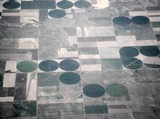
Did you have an idea for improving this content? We’d love your input.
- Subject:
- Agriculture
- Forestry and Agriculture
- Material Type:
- Lesson
- Author:
- Erin Krier
- Date Added:
- 06/14/2023

Did you have an idea for improving this content? We’d love your input.
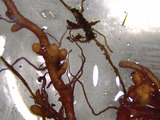
Alder module.Image and content credit: Fernando Agudelo-Silva
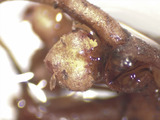
Alder module.Image and content credit: Fernando Agudelo-Silva
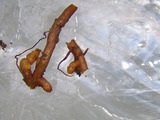
Alder module.Image and content credit: Fernando Agudelo-Silva
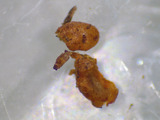
Alder module.Image and content credit: Fernando Agudelo-Silva

Alder module.Image and content credit: Fernando Agudelo-Silva

Alder module.Image and content credit: Fernando Agudelo-Silva

This textbook provides a survey of statistical methods commonly used in the life sciences, an introduction to statistical theory, and significant exposure to the statistical software package SAS 9.4. The textbook is designed for graduate students and upper division undergraduates, and assumes some familiarity with mathematical notation, functions, and algebra. No previous courses in statistics are needed. For those interested in using the software package R, programs similar in function to the SAS ones are also provided. A unique feature of this textbook is the integration of statistical procedures and theory. Most introductory texts present the statistical procedures and a mechanistic explanation of how they work, without discussing the underlying theory. Some knowledge of this theory is essential for students in the life sciences, especially graduate students, and so the textbook uses likelihood theory to explain how parameters are estimated and statistical tests derived. The statistical models for ANOVA, regression, and other common procedures are also presented. These theoretical concepts are presented in both equation and graphical form. For detailed information on the topics covered in this textbook, see the Table of Contents file in Section 1.
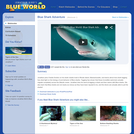
In this video, Jonathan joins Charlie Donilon on his shark charter boat in Rhode Island, Massachusetts, and learns about how shark tagging has shed light on the biology of and behavior of Blue sharks. Tagging has shown that these incredible swimmers actually migrate completely across the Atlantic ocean. Jonathan tries his hand at tagging a shark and then swims with Blue sharks. We also learn that Blue sharks are not nearly as vicious as they have been reputed to be, and the divers are actually able to pet the sharks! Please see the accompanying study guide for educational objectives and discussion points.
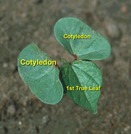
A knowledge of broadleaf plant parts will help the student identify plants at various stages of life. The weed ID resource books often use technical terms to describe how the plant parts look. It is important the student understands the technical terms in order to properly identify weed species. Students will also practice using common weed id apps
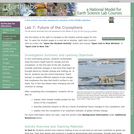
In this activity, students explore connections between climate change and the cryosphere. In Part A, they learn about how scientists study past climate records using ice cores. In Part B, students examine the role ice melt might play in future sea level rise due to climate change.

Did you have an idea for improving this content? We’d love your input.
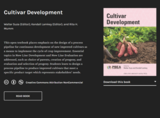
This open textbook places emphasis on the design of a process pipeline for continuous development of new improved cultivars as a means to implement the cycle of crop improvement. Essential topics in New Line Development and New Line Evaluation are addressed, such as choice of parents, creation of progeny, and evaluation and selection of progeny. Students learn to design a process pipeline to produce improved cultivars that meet a specific product target which represents stakeholders’ needs.
Each of the books in the PBEA series comes with a section in its back matter titled "Applied Learning Activities" which includes additional content aligned to each chapter such as handouts and worksheets, csv files, code for statistical analysis in R, and recommended readings.
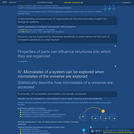
In this deterministic cellular automata model, interactions between neighboring automata are described using a prisoner's dilemma. Limiting dispersal of seeds of annual plants can permit heterogeneous co-existence, whereas thorough mixing instead allows one subpopulation to dominate quickly.

Digital Project and associated STEAM Lessons about Waste Prevention and reuse jon arambarri, Maria Madarieta, Leire Armentia A sequence of teaching units and activities including associated STEAM lesson with the aim of acquiring a series of specific skills about waste management (in particular about Waste source separation and recycling).This is the first Digital Project of a set of 6 facing specific challenges about waste management for primary and secondary education Preview

A sequence of teaching units and activities including 3 associated STEAM lessons with the aim of acquiring a series of specific skills about waste management (in particular about Waste source separation and recycling).This is the second Digital Project of a set of 6 facing specific challenges about waste management for primary and secondary education

A sequence of teaching units and activities with the aim of acquiring a series of specific skills about waste management (in particular about Home compost/Food waste).This is the third Digital Project of a set of 6 facing specific challenges about waste management for primary and secondary education
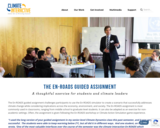
The En-ROADS guided assignment challenges participants to use the free online En-ROADS simulator (https://en-roads.climateinteractive.org/) to create a scenario that successfully addresses climate change while considering implications across the economy, environment, and society. The En-ROADS assignment is used in classrooms, ranging from middle school to graduate level students, and comes in short and long forms. It can also be adapted as an exercise for non-academic settings. Often, the assignment is given following an En-ROADS workshop or Climate Action Simulation role-playing simulation game (https://www.climateinteractive.org/en-roads/).
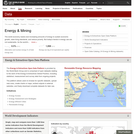
Data sets and graphs on energy production, use, dependency, and efficiency are compiled through following key World Development Indicators.

This OER will help learners to understand properly the Estimation of Forest Stock By:Defining and Measure Properly all Single Tree ParametersExplaining and Calculate Adequately Stand ParametersEstimating the Stock of Forest eithefelled or stand